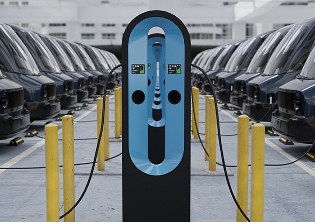Encouraging fuel efficient driving habits in your fleet
May 15, 2025

Did you know that a single hour of engine idling can burn up to a gallon of fuel (approximately 3.8 litres)? Now multiply that by your entire fleet over a week, a month, or a year. The numbers are staggering, aren’t they? Fuel costs might seem out of your hands, but smarter driving habits can shift the equation in your favour.
Here’s how you can encourage fuel efficient driving habits with a mix of effective techniques, impactful fleet driver training, and motivating incentives.
Top fuel efficient driving techniques your drivers should know
The behaviours your drivers adopt behind the wheel play a big role in fuel consumption. Poor habits don’t just burn through fuel; they also drain your budget. But the good news is that small, consistent changes in driving behaviour can lead to remarkable savings.
-
Say ‘No’ to aggressive driving: Speeding, rapid acceleration, and harsh braking are some of the biggest ways to reduce fuel economy. Encourage your drivers to maintain a steady speed and anticipate traffic to avoid unnecessary starts and stops. Why? Aggressive driving can lower fuel efficiency by 15-30% on highways. That’s a lot of fuel and money (literally) going up in smoke.
-
Limit idling: While traffic conditions can sometimes force idling, minimizing unnecessary engine run-time, like warming up or waiting at a job site, can be avoided and addressed, in fleet driver training programs.
-
Keep tires properly inflated: Under-inflated tires are not only unsafe but increase rolling resistance, putting more strain on the engine. Properly inflated tires can improve gas mileage by up to 3%, an easy fix, that can result in fuel savings.
-
Lighten the load: Excess weight can reduce fuel efficiency by 1% for every 100 pounds carried. Fleet drivers often carry tools and equipment, but ensuring vehicles are not overloaded and drivers aren’t lugging around unnecessary items can save fuel and wear on the vehicle.
Why is fleet driver training essential for fuel efficiency?
A well-structured fleet driver training program can focus on fuel-saving techniques, monitoring driving behavior, and increasing awareness around maintenance practices.
Training modules should include interactive lessons on the impact of speeding, idle reduction strategies, and basic vehicle upkeep like monitoring tire pressure. This isn’t just about telling drivers what not to do; it’s about showing them how these changes directly benefit them, through minimizing wear on their vehicles and enhancing overall safety.
Consistency matters too. Regular training, perhaps once or twice a year, reinforces lessons and keeps good practices fresh. For added effectiveness, consider brief monthly newsletters to fleet drivers with quick tips to loop fuel-saving techniques into their daily routines.
How to incentivize fuel-efficient driving habits
While training sets the foundation, you need a strategy to keep these habits alive. Positive reinforcement goes a long way in encouraging lasting changes.
- Reward the right behaviors: If one of your drivers achieved a significant improvement in fuel efficiency, acknowledge them! Whether it’s gift cards, extra vacation days, or public recognition, rewarding efforts motivates others to follow suit.
- Introduce gamification: Fuel efficient driving habits can become a fun competition. Set up leaderboards using telematics to track metrics like lowest fuel consumption per trip or minimal idling times. Friendly rivalry fosters engagement and maintains interest.
- Share the cost savings: Highlight how fuel-efficient behaviors directly benefit them. Whether there are bonuses tied to savings or regular updates on how their habits collectively reduce the company’s carbon footprint, showing drivers the tangible effect of their efforts is crucial for buy-in.
- Provide real-time feedback: Leverage telematics to give drivers immediate feedback on their driving habits. Alerts for speeding, idling, or harsh braking remind them to course-correct in real-time. In the long term, this data can be used to celebrate progress or pinpoint areas for improvement.
Reducing fleet fuel costs through driver behavior
Fuel efficiency isn’t just a short-term win; it’s a long-term strategy that delivers lasting value. Encouraging sustainable driving practices reduces operating costs, extends the lifespan of your vehicles, and enhances driver safety.
But the benefits don't stop there. Each gallon of fuel saved shrinks your environmental footprint, aligning seamlessly with your organization’s sustainability goals and demonstrating your commitment to a sustainable future.
By integrating comprehensive fleet driver training, practical fuel-saving techniques, and motivational incentive programs, you can create a culture of efficiency that drives measurable results for your business and the planet.
Take the next step
Building a culture of fuel efficiency starts today. Equip your drivers with the tools and training they need to adopt habits that benefit not just your business, but the environment too.
Contact us today and redefine what’s possible for your fleet!
Never miss an update
Subscribe for more news and thought leadership from Element.


